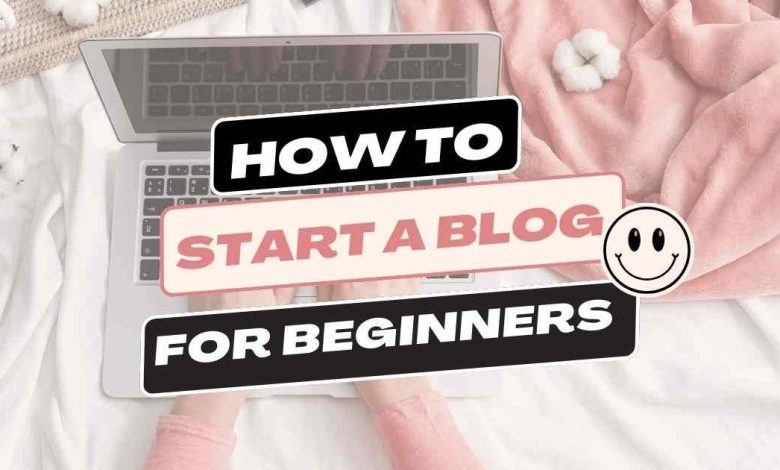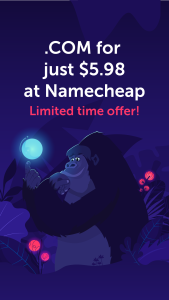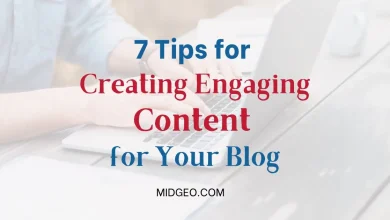How to Start a Blog for Beginners in 2025 – Step by Step Guide
HOW TO START A BLOG IN 10 MINUTES – 2024 BEGINNER TUTORIAL | MAKE MONEY BLOGGING

How to Start a Blog for Beginners in 2025: Starting a blog can be an exciting journey, and if you’re new to the world of blogging, you’re in the right place.
In this comprehensive guide, we will walk you through the process of creating your very own blog, step by step, How to Start Blogging in 2025 From Home for Free, and Make Money.
Whether you’re looking to share your passions, build an online presence, or even make money through blogging, we’ve got you covered. Let’s dive in!
How To Start A Blog For Beginners 10 Simple Steps in 2025
I. Choosing the Right Blogging Platform
A. Exploring Popular Platforms
When you’re embarking on your blogging journey, one of the critical decisions you’ll make is choosing the right platform. Here, we’ll take a closer look at the most popular options:
WordPress
WordPress is the top choice for bloggers worldwide, and for good reason. It offers unparalleled flexibility and customization. Whether you want a personal blog or a full-fledged website, WordPress has you covered. It boasts a vast library of plugins and themes, allowing you to tailor your site to your heart’s content. However, it does come with a steeper learning curve for beginners.
Blogger
If you’re a beginner looking for a straightforward and user-friendly platform, Blogger might be your best bet. It’s owned by Google, making it easy to set up, and it offers a range of simple templates. While it’s less customizable than WordPress, it’s a solid choice for those just starting.
Wix
Wix is known for its drag-and-drop website builder, making it remarkably user-friendly. It offers a wide range of templates and design options, allowing you to create a visually appealing blog. It’s particularly great for beginners with limited technical skills.
B. How to Make the Right Choice
Now that you’re familiar with these popular platforms, it’s time to decide which one suits your needs best. Which Blogging Platform is Best for Making Money In 2025 Here’s how:
- Consider Your Blogging Goals: Are you looking for a simple personal blog or a website with advanced features? Your goals will play a significant role in your platform choice.
- Analyze Features: Take a closer look at the features each platform offers. Consider what’s essential for your blog, whether it’s e-commerce capabilities, membership sites, or a particular look and feel.
- Cost Considerations: Budget matters. WordPress itself is free, but you’ll need to pay for hosting and potentially themes and plugins. Blogger is free, while Wix offers both free and premium plans. Carefully examine the costs associated with your choice.
- User-Friendliness: Consider your technical skills. If you’re not tech-savvy, a user-friendly platform like Blogger or Wix might be more suitable.
II. Setting Up Your First Blog
How to Start a Blog in 10 Mins – Simple & Easy (Step-by-Step) Blogging for Beginners Ideas:
A. Domain Registration and Hosting
Now that you’ve chosen a platform, the next step is setting up your blog. This begins with domain registration and hosting:
Domain Registration
A domain name is your blog’s web address, like “www.yourblogname.com.” It’s essential to choose a memorable, relevant, and brandable domain name.
You can register domains through various services, and costs can range from a few dollars to hundreds, depending on the domain’s uniqueness.
Hosting Services
You’ll also need a hosting service to store your blog’s files and make them accessible on the internet. There are different types of hosting, including shared hosting, virtual private servers (VPS), and managed hosting.
- Shared Hosting: Economical and suitable for beginners, but it means you share server resources with other websites.
Limited time offer:
51% off 1st yr Shared Hosting!
- VPS Hosting: Offers more resources and control, ideal for blogs with growing traffic.
Limited time offer:
VPS hosting: up to 30% off!
- Managed Hosting: The most hands-off option, where the hosting provider takes care of most technical aspects.
B. Installing and Configuring the Blogging Platform
With your domain and hosting in place, you can now install and configure your chosen blogging platform:
WordPress Installation
- Log in to your hosting account’s control panel.
- Use the one-click WordPress installation option.
- Follow the setup wizard, providing your blog’s title, admin username, and password.
- Once installed, you can customize your blog’s appearance and install essential plugins.
III. Essential Blogging Tools
A. Grammarly: Your Grammar Guru
Good grammar is vital in the blogging world. That’s where Grammarly comes in. This tool is like having a virtual writing assistant.
It checks your content for spelling, grammar, and punctuation errors, making your writing cleaner and more professional.
B. Canva: Crafting Visual Appeal
In the online world, visuals matter as much as the words you write. Canva is a user-friendly graphic design tool that empowers you to create stunning visuals for your blog.
From featured images to infographics, Canva helps make your content visually appealing.
C. Google Analytics: Tracking Your Progress
Understanding how your blog performs is crucial. Google Analytics is a free and robust tool that provides in-depth insights into your blog’s traffic, audience behavior, and more.
It’s a must-have for measuring your blog’s success and making data-driven decisions.
IV. Writing Your First Blog Post
“You know, setting up your blog is a one-time task, but your blog posts are the heartbeat of your website.”
How to Write Your First Blog Post: 10 Steps for Beginners in 2025 This guide will help you Learn more.
A. Crafting Engaging Content
Your first blog post is your introduction to the world. Make it count with these tips:
- Hook Your Readers: Start with an attention-grabbing headline or story.
- Be Concise: Clear and concise writing keeps readers engaged.
- Use Subheadings: Break your content into sections with subheadings for easy navigation.
- Include a Call to Action: Encourage readers to comment, share, or take a specific action.
B. SEO-Friendly Content
Search Engine Optimization (SEO) is vital for attracting organic traffic. Here’s how you can make your content SEO-friendly:
- Keyword Research: Identify relevant keywords for your topic.
- Keyword Placement: Strategically use keywords in your content, including the title, headers, and throughout the text.
- Quality Backlinks: Build high-quality backlinks from other websites to improve your blog’s authority.
V. Creating Engaging Content
A. The Power of Storytelling
Storytelling is a potent tool for engaging your readers:
- Emotion Evokes Engagement: Stories that evoke emotions connect better with your audience.
- Use Anecdotes: Personal anecdotes can make your content relatable and memorable.
- Narrative Structure: Craft your content with a clear beginning, middle, and end.
7 Tips for Creating Engaging Content for Your Blog
B. Visuals Matter
I mentioned before, Images, videos, and infographics can significantly enhance your content:
- Eye-Catching Visuals: Use images and graphics to break up text and make your content visually appealing.
- Infographics: Present complex information in an easy-to-understand format.
- Visual Consistency: Maintain a consistent visual style across your blog.

C. Formatting for Readability
Readable content is more likely to keep your audience’s attention:
- Scannable Text: Use short paragraphs, bullet points, and lists to make your content easy to scan.
- Headings and Subheadings: Organize your content with clear headings and subheadings.
- Font and Typography: Choose fonts and typography that are easy on the eyes.
Stay tuned for the next segment, where we’ll explore strategies to promote your blog and increase its visibility.
VI. Promoting Your Blog
This is the important part everyone missed.
A. Social Media Engagement
Your blog won’t get far without an active presence on social media platforms. Here are some strategies to consider:
- Platform Selection: Choose the social media platforms that align with your target audience.
- TikTok
- YouTube
- And my favorite Pinterest
Content Sharing: Regularly share your blog posts and other relevant content.
Engagement: Interact with your followers, respond to comments, and participate in discussions.
B. Email Marketing
In 2024, the main tool of online marketing is email marketing. Without email marketing, 2025 will not be imagined as an online business. Email marketing is a powerful way to build a loyal readership:
- Building a Mailing List: Encourage blog visitors to subscribe to your newsletter.
- Newsletter Content: Provide valuable content in your newsletters, including blog highlights and exclusive content.
- Consistency: Maintain a regular email schedule to keep your audience engaged.
C. Guest Posting
Guest posting involves writing articles for other blogs or websites. It’s a beneficial strategy for increasing your blog’s visibility:
- Finding Opportunities: Look for blogs and websites that accept guest posts in your niche.
- Pitching Your Ideas: Craft a compelling pitch to secure guest posting opportunities.
- Writing High-Quality Content: Deliver well-researched and insightful posts that showcase your expertise.
VII. Monetizing Your Blog
Now it’s time to start making money from blogging.
A. Affiliate Marketing
Affiliate marketing is a popular way to monetize your blog:
- How It Works: Promote products or services, and earn a commission for each sale generated through your affiliate links.
- Choosing the Right Programs: Select affiliate programs relevant to your niche and audience.
B. Sponsored Posts
Sponsored posts involve collaborating with brands to create content for their products or services:
- Building Relationships: Connect with brands or use influencer platforms to find sponsored post opportunities.
- Transparency: Clearly disclose sponsored content to maintain trust with your audience.
C. Ad Revenue
Generating revenue through ads is a common monetization method.
- Ad Networks: Sign up with ad networks like Google AdSense, Ezoic, or Media.net.
- Ad Placement: Place ads strategically to maximize visibility without overwhelming your readers.
VIII. SEO for Beginner Bloggers
A. Basic SEO Practices
Now it’s time to learn more. SEO is crucial for attracting organic traffic. Here are some basic practices:
- Keyword Research: Find keywords relevant to your blog’s content.
- On-Page SEO: Optimize your content by including keywords in titles, headers, and the body of your posts.
- Off-Page SEO: Build backlinks from reputable websites to improve your blog’s authority.
B. Keyword Research Tips
Effective keyword research is essential for your blog’s success:
- Long-Tail Keywords: Target-specific, less competitive long-tail keywords.
- Keyword Tools: Use tools like Google Keyword Planner, Ubersuggest, or Ahrefs for keyword research.
- User Intent: Consider what users are looking for when choosing keywords.
IX. Understanding Blog Analytics
A. Introduction to Analytics
Understanding how your blog performs is crucial to its growth. Google Analytics is a powerful tool for this:
- Traffic Analysis: Monitor the sources of your traffic (organic, direct, social, etc.).
- Audience Behavior: Analyze how visitors interact with your content.
- Conversion Tracking: Set up goals and track conversions on your blog.
X. Avoiding Common Mistakes
A. Neglecting SEO
Neglecting SEO can hinder your blog’s success. Avoid this mistake by:
- Prioritizing SEO: Make SEO an integral part of your blogging strategy.
- Continuous Learning: Stay updated on SEO best practices to adapt to changes.
B. Inconsistent Posting
Consistency is key in the blogging world. Avoid inconsistent posting by:
- Creating a Content Calendar: Plan your content in advance and stick to a posting schedule.
- Batching Content: Write and schedule multiple posts ahead of time.
C. Ignoring Analytics
Analytics provide valuable insights. Don’t ignore them:
- Regular Review: Set aside time to review your blog’s analytics data.
- Actionable Insights: Use the data to make informed decisions and refine your blogging strategy.
To wrap things up, starting a blog as a beginner can be an exciting and rewarding experience.
From choosing the right platform to crafting engaging content, promoting your blog, and monetizing it, you’ve learned the essentials to get started.
Remember, blogging is a journey that involves continuous learning and improvement. Embrace it, stay consistent, and watch your blog flourish.
Now that you have a solid foundation, the world of blogging is yours to explore. Happy blogging!
Don’t forget to check out the FAQs section for additional insights into blogging as a beginner.
FAQs: How to Start Blogging in 2025
Q.1. How long does it take to set up a blog as a beginner?
Setting up a blog can vary in time depending on your familiarity with the process and the platform you choose. On average, it might take a few hours to a day for domain registration, hosting setup, and platform installation. However, content creation and promotion are ongoing efforts.
Q.2. Which blogging platform is the best for beginners?
The best platform depends on your goals and preferences. WordPress is highly customizable but has a steeper learning curve. Blogger is beginner-friendly but less flexible. Wix offers a user-friendly interface and design options. Consider your needs and choose accordingly.
Q.3. Can I make money as a beginner blogger?
Yes, you can make money as a beginner blogger, but it takes time and effort. Options include affiliate marketing, sponsored posts, and ad revenue. Focus on creating valuable content and growing your audience to increase your income potential.
Q.4. What are some common mistakes that beginner bloggers make?
Common mistakes include neglecting SEO, inconsistent posting schedules, and ignoring analytics. These mistakes can hinder your blog’s growth. To succeed, learn from these errors and continuously improve your blogging strategy.
Q.5. Do I need to be an expert in SEO to start a blog?
No, you don’t need to be an SEO expert to start a blog. Basic SEO practices, such as keyword research and on-page optimization, can significantly improve your blog’s visibility. As you gain experience, you can delve deeper into SEO strategies.





